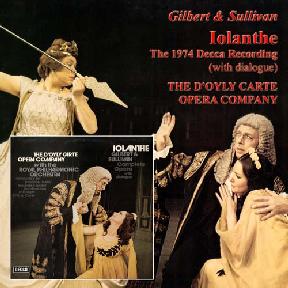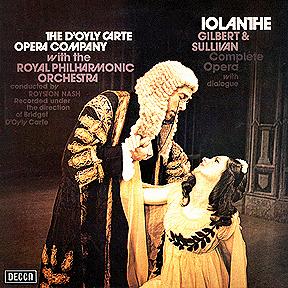The 1974 D'Oyly Carte Iolanthe
D'Oyly Carte Opera Chorus
Recorded at Decca Studios, West Hampstead |
|
 Sounds on CD VGS251 |
Of all the recordings D'Oyly Carte ever made, this one surely had the least artistic purpose. The Company already had an excellent stereo Iolanthe in the catalog, there was no new technology to exploit, two of the leading comedians (Reed and Sandford) were still the same, no special occasion was celebrated, and no new material was recorded.
Except for Strephon and Phyllis, the 1960 cast gives a better performance in every respect. The Tolloller here is laughably bad; he and Ayldon have nothing like the kind of repartee enjoyed by Thomas Round and Donald Adams in 1960. John Reed's diction in the nightmare song has noticeably deteriorated in the intervening years.
Bruce Miller observes:
I prefer Godfrey's leadership in this instance, and this is one reason why I rank the 1960 set as more desirable. The 1974 set also omits the extra on-stage military band, which is included for the first and only time in the aforementioned Godfrey recording. Furthermore, 1960 shows us Godfrey at his very best, and the company and principals are also uniformly in a happy state, especially the chorus, which is magnificent.
Jamie Moffat wrote:
Browsing through the G&S Discography I came across a generally damning review for the 1974 Decca D'Oyly Carte Iolanthe. This isn't a recording I have given a moment's though to in years, but the review gave me pause. This was the first recording I ever owned of the opera, and it caused me to fall in love with the work. Can it really be that bad?
So I trotted out the old vinyl discs from the store room and gave them another spin. Well, yes I've heard much better recordings of Iolanthe, and this has the misfortune to be the weakest of a strong line of renditions on disc. The 1951 and 1960 recordings are both wonderful, though IMHO both have been surpassed by the 1992 effort. But I wouldn't describe the 1974 effort as a complete write off.
Fourteen years had elapsed since the last recording, the D'Oyly Carte had a new stable of stars, with only two of the 1960 cast being still on hand. These strike me as persuasive reasons to make the recording. John Reed and Kenneth Sandford are both excellent, and suffer only by comparison with their younger selves. In and of themselves they give good accounts of themselves. Pamela Field and Michael Rayner are both excellent, better I feel than their counterparts in either the 1951 or 1960 recordings. Field is especially good, her delivery of "My behaviour is rustic but hearty" being a model lesson to anyone attempting the role.
Malcom Williams is a weakness; he didn't have a long tenure with D'Oyly Carte and it's hard to wish it otherwise. But it's only his dialogue that is really bad; his singing is pleasant, though one could wish for a more vigorous and energetic sound. He's quite good in the ensembles.
But the big flaw with this recording is not from D'Oyly Carte at all — it is from Decca! There was a marked shift in Decca's recording policies from the 1960s to the 1970s. In the 60's they favoured a large ambient acoustic, generally flattering to voices and giving a good sense of theatre. By the 70s this had given way to a harder, edgier sound, one that favoured solo instruments and orchestral sound, but wasn't terribly kind to voices. Joan Sutherland's recordings of this period often pick up an obtrusive beat in the voice that simply wasn't apparent in the theatre. Close miking is the culprit I suspect.
And so it is with the D'Oyly Carte recordings of the period. Three voices suffer very badly on this recording — Judi Merri, Lyndsie Holland and John Ayldon. I never heard the first two in the flesh but people I know who did speak nothing but praise for them. Merri's Iolanthe, I'm told, sent shivers down the spine in the second act. On the record she sounds wobbly, unfocussed and murky, and I wonder if more flattering recording might have helped. I did hear John Ayldon in the theatre and in this role, and I can vouch that the hard, edgy and grating tone is not a true reflection of what I heard at the Princess Theatre.
On the whole, I have to agree that this is not a complete success, but the failures strike me as more techical than artistic. Its worth another look, though, for it does offer some real joys, especially the dialgue between Strephon and Phyllis in Act Two.
Steve Woodland wrote:
The second stereo D'Oyly Carte Iolanthe isn't very good. However, at this late date, it does have archival value. I venture to say that this set might have been better without dialogue — I find it poorly executed (except for Patricia Leonard's wryly delivered "She certainly did suprising things..."). It seems to me that the whole cast (except for Reed and Sandford) were simply trying too hard to avoid duplicating the line readings of their recorded predecessors. The result is awkward. Still, I maintain an affection for this recording. It was the first recording that I owned with John Reed. Is that reason enough for its re-issue? Probably not, but I still pop it on the turntable from time to time.
Chris Webster wrote:
I think that the 1974 Iolanthe was worth making if only to have that wonderful little shriek from John Reed at the end of the Queen's declamations in the act one finale. If you've got a copy of this set, please do have a listen to this section — it's wonderful. In fact Dear John has so much more character in this recording than in the earlier one, and some may characterisation better than his earlier one, although I'm sure that while others will prefer a straighter reading, but from my point the more personality the better, within reason.
I disagree with Marc that this was a pointless (or whatever the quoted word was) recording, and although Marc has tried to validate his reasoning by showing us what new things the other recordings of the 70s included or took in technologically, I do not think that this is any argument at all. Marc seems to be arguing that the Iolanthe recording was pointless because there was no bonus material and no new technology, whereas the other did have a point in being recorded because of the fillers, and this just doesn't gel with me. Decca would have made these recordings whether they were including filler material or not, and so Iolanthe was just part of the run that happened to be before the "filler" policy was introduced. I do not believe that the 1973 Mikado would not have been recorded if John already done it, and I also do not believe that the 1971 Pinafore would not have been recorded if it wasn't for the Phase 4 gimmick. Decca had, and still has, a policy of re-recording works every so many years. This is partly to take in new artists, and by necessity this often coincides with new technology, but I do feel that the latter is more incidental and a necessity only because technology does progress.
Many of the operas were recorded in close succession in the 60s, certainly far too close together to warrant a new recording in that short space of time, but by the 70s enough time had elapsed for Decca to start re-recording them. It must also be remembered that Decca only had a 10 year contract restricting DC from recording the same work with any other recording company, and so re-recording the operas every so often protected their investments, while at the same time giving them new investments.
The recording is worthwhile — even if only as a record of the Company's stage performances at the time. It might be argued by some (certainly not me) that because some of the mono Decca recordings are inferior they were not worthwhile, but where would we be without them? We'd be with no knowledge of how the performances were at this period, the same as if we hadn't had the 1974 Iolanthe, and just because some think (again not me) that it isn't very good does not mean that it is not worthwhile. Any documentation of a stage performance is worthwhile even if it only shows that the performances weren't as good as they were. A prime example here might be Princess Ida. A recording of this opera in 1977 may have been awful, but as it is it is extremely regrettable that none was made, because we don't know whether it was or not (except that I do know because I've got a live recording from this period, and a 77 Ida would very likely have been wonderful).
| Date | Label | Format | Number |
|---|---|---|---|
| 1974 | Decca | Stereo LP | SKL 5188/9 |
| Decca Australia | Stereo LP | SKLA 5188/9 | |
| London | Stereo LP | OSA-12104 | |
| Cassette | OSA5-12104 | ||
| 197-? | Decca Australia | Cassette | KSKC 5188/9 |
| ca. 1979 | Decca Australia | Cassette | K2C 35 |
| 197-? | World Record Club | Stereo LP | 1564D2 |
| Sounds on CD | 2005 | CD | VGS251 |

